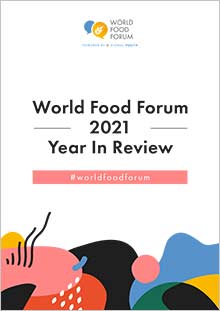WORLD FOOD FORUM
2021
YEAR IN REVIEW

INTRODUCTION
 “The
ingenuity and energy of global youth are one of our biggest resources.
Tapping into this potential energy through initiatives like the World
Food Forum, is essential to overcoming global hunger and achieving the
Sustainable Development Goals.” - Máximo Torero, FAO Chief Economist and Youth Committee Chair
“The
ingenuity and energy of global youth are one of our biggest resources.
Tapping into this potential energy through initiatives like the World
Food Forum, is essential to overcoming global hunger and achieving the
Sustainable Development Goals.” - Máximo Torero, FAO Chief Economist and Youth Committee Chair
The year 2020 marked a huge shift in global consciousness. Already, nearly one in ten people in the world were facing hunger, and nearly three billion people could not even afford a healthy diet. Increasing extreme weather events due to climate change and the rise of pests, such as desert locusts in Africa, were threatening crops and livelihoods.
Then the COVID-19 pandemic hit and our already stressed-out agrifood systems were thrown into peril. Border restrictions and lockdowns slowed harvests, destroyed livelihoods and hindered food transport. Food loss and waste increased, as farmers were forced to dump perishables that could not make it to markets. Meanwhile, many people living in urban centres were struggling to access fresh food. During the COVID-19 pandemic, the prevalence of undernourishment drastically increased, and projections indicated that as many as 811 million people in the world faced hunger in 2020.
It became clearer than ever the status quo was simply not cutting it. If we are to reach the Sustainable Development Goals (SDGs) by 2030, particularly the goal of “Zero Hunger”, we need a cataclysmic shift. We need positive disruption, global collaboration, and game-changing innovations to transform our agrifood systems to be more sustainable, resilient and egalitarian in order to achieve a better food future for all.
At the same time, it is the younger generation who is affected most by the decisions of the past and the actions we take today. Youth will face the biggest tolls of climate change. Youth are the ones who are called to fight in conflict situations, which are one of the leading causes of food crises, and youth are the ones who will inherit and cultivate our precious agrifood systems to feed generations to come.
Young people are not just the leaders of tomorrow, we firmly believe that they also need to be the leaders of today. Through the World Food Forum (WFF), youth have formed an independent platform for real and lasting change. As youth leader Dara Karakolis said, "The World Food Forum not only gives a seat at the table, it creates that table. By trusting us, you empower us.”
We have witnessed the transformative power of young people acting as bold and inclusive leaders. Through this platform, youth are guiding us towards new ways of working together. They are encouraging and scaling up solutions-based innovation, and they are creating powerful platforms for dialogue, knowledge sharing and action.
Just as our agrifood systems are interconnected, our actions to transform them must also be holistic and interconnected. The WFF is truly a testament to how game changing action can have a ripple effect around the world, and it has ensured that the perspectives of youth at large, including Indigenous communities, smallholder farmers and marginalized voices are heard loud and clear.
In witnessing the growth of the WFF this year, we are reminded of the wise words of the entrepreneur Derek Sivers: “If you really care about starting a movement, have the courage to follow and show others how to follow.” Speaking from our perspectives as an older (but still young at heart!) generation, let us follow and support the lead of young people everywhere.
Let’s listen to the many diverse youth voices, united by the common goal of a better food future for all and heed their calls for action in the areas of better production, better nutrition, better environment and a better life, to achieve the SDGs and ensure a better food future for all and achieve the SDGs.
Máximo Torero, FAO Chief Economist and Youth Committee Chair
and Kazuki Kitaoka, World Food Forum Coordinator
TIMELINE
DOWNLOAD THE REPORT

